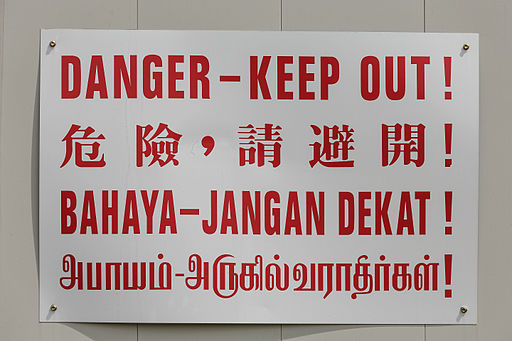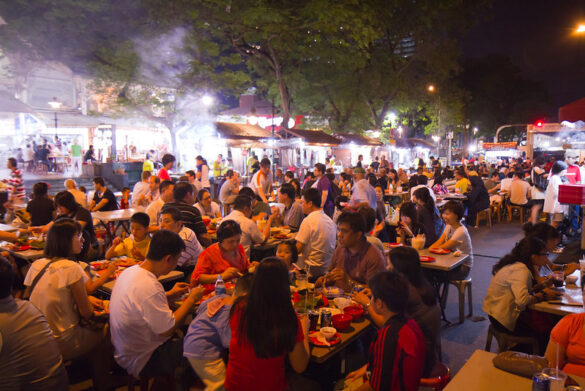Welcome to the Melting Pot of Languages!

These danger signs are commonly seen around Singapore. They show Singapore’s 4 official languages in order of adoption: English, Mandarin, Malay and Tamil. Image credit: Wikimedia Commons
Singaporeans use a blend languages. Our unique charm lies in our diversity. We have several ethnic communities living side by side, each with their own languages. But don’t worry if you’re a newcomer – English is the bridge that connects us all! It’s widely used in businesses, schools, and government offices.
Interestingly, we’ve also developed our very own language, called Singlish. It’s a fun mixture of English, Chinese, Tamil, and Malay vocabularies and grammar. You’ll probably hear it when you chat with locals in the coffee shops, or ‘kopitiams’ as we call them.

Some 76% of Singapore’s citizens and permanent residents are ethnically Chinese – as can be seen in Singapore’s Chinatown around Chinese New Year. Image credit: Wikimedia Commons
A Mosaic of Chinese Dialects
Historically, Singapore has been a major hub for immigrants from different parts of China, and they brought their unique dialects along with them. Hokkien, Teochew, Cantonese, Hakka, and Hainanese dialects each have their own pockets of speakers in Singapore. These dialects were largely the mother tongues of the earlier Chinese immigrants, hailing from different provinces in China.

In the evening, chairs are set up on a street in the middle of Singapore’s Central Business District and it becomes a dining venue. Like languages spoken in Singapore, the dishes are often a blend of Chinese, Malay and Indian cuisines. Image Credit: Jenius Shieh
Mandarin and Cantonese: The Two Major Players
Among these dialects, Mandarin and Cantonese stand out. Mandarin is commonly spoken in the northern parts of China and has become the official language of places like Beijing, Taiwan, and Singapore. Cantonese, on the other hand, is spoken mainly in the southern areas of mainland China and Hong Kong.
Mandarin vs. Cantonese: Which is More Useful in Singapore?
If you’re thinking of learning a Chinese language while you’re here, Mandarin will be most useful to you. Among with English, Malay and Tamil, it’s one of Singapore’s four official languages. Singaporean Chinese learn Mandarin in school, making it the most widely spoken version of Chinese.
Singapore-style Mandarin sounds a bit different from what’s spoken in mainland China, just like how American English differs from British English. But don’t worry, you’ll get the hang of it soon! When it comes to writing, we generally use Simplified Chinese characters.
Cantonese is less commonly spoken, so if you choose to learn Cantonese, you might find fewer opportunities to practice it in Singapore (although it’s a must in Hong Kong!).
Related Posts
The Pros & Cons of Moving to Singapore as an expat
Discover the pros and cons of living in Singapore as an expat. From housing to safety, social networking, transportation, and more, get a balanced view of life in this city-state.
Are you new in Singapore?
Yi Mandarin is a Mandarin school located in Singapore. We offer online Mandarin classes via zoom and in-person classes at our centre. If you are travelling to Singapore or are already in Singapore, be sure to visit us and ask us for a souvenir.

